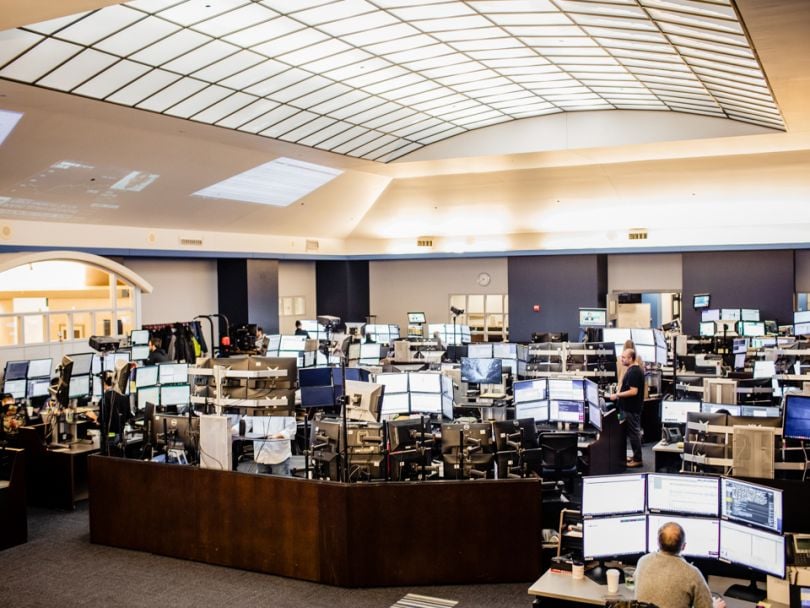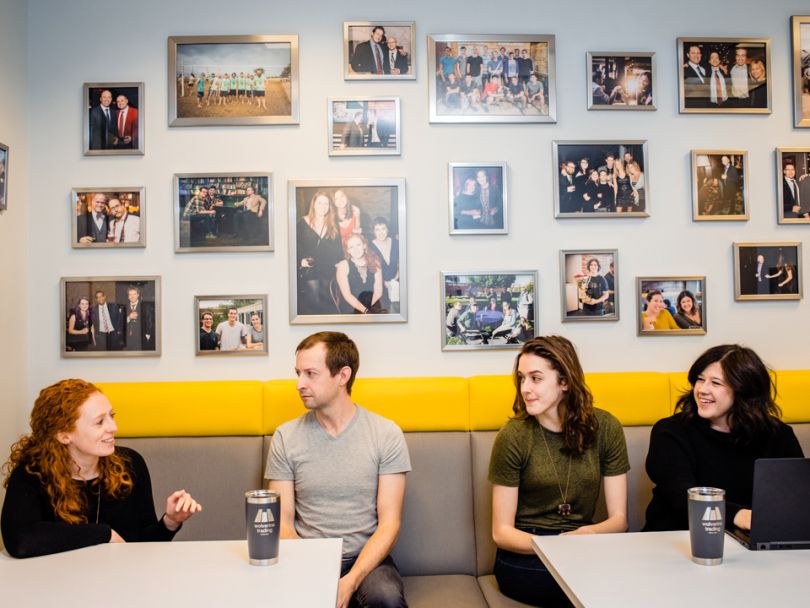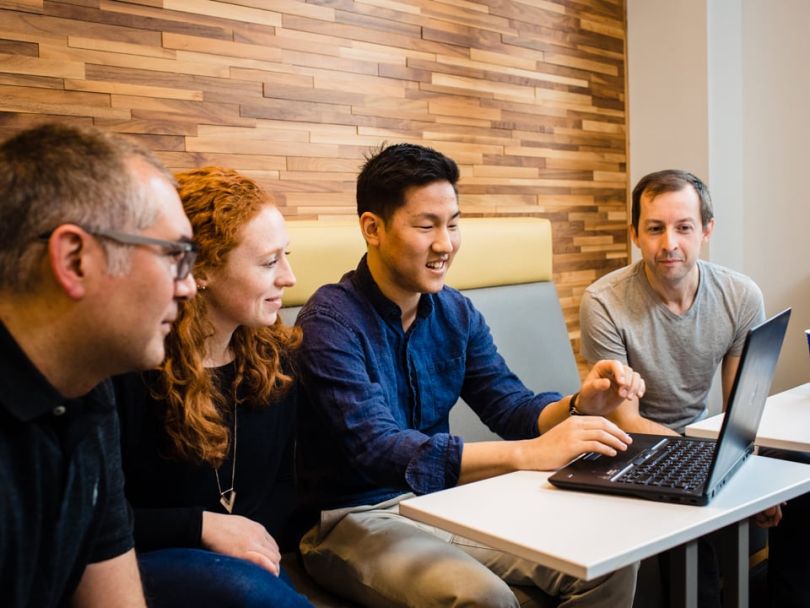Joining a tech firm following college graduation isn’t uncommon. But staying is.
For Wolverine Trading Software Engineer Sarah Paris, it’s been three-and-a-half years. For Principal Software Engineer Valentina Veselinovski, it’s been almost 12 years, and for Partner Mike Gorczowski, it’s been 17 years.
For Paris and Veselinovski, the opportunity was a seamless transition following internships at Wolverine and a larger trading firm, respectively. For Gorczowski, a college grad looking to stay in Chicago amid the dot-com crash, Wolverine seemed like a place where he could grow.
Despite joining almost decades apart and for reasons that vary, why these three continue to serve Wolverine share much in common — and it begins with impact.
“Throughout my career here, I’ve been able to see very clearly the impact of my work,” Gorczowski said. “That’s something that I couldn’t have told you was important to me when I started here, but as time has gone on, I’ve increasingly grown to appreciate that.”
Visible individual contributions, paired with trust from Wolverine to own their work, continue to keep these three employees present and engaged.
Gorczowski’s role at Wolverine has evolved greatly since he first joined in 2003. Initially a software engineer on a team of three, Gorczowski became an expert on the systems he helped build. Now, he oversees the hardware and software development projects to ensure they meet the higher-level goals of the engineering and trading teams.
Wolverine leans on Veselinovski’s team to determine what opportunities are available in the marketplace that the company might want to consider acting upon. Rather than wait for Wolverine’s trading teams to come to the developers with requests, she and her team proactively identify potential areas they think traders may want to pursue.
Paris primarily works on developing software and systems to be used by Wolverine’s market maker trading desk, which displays quoted prices to buy or sell various securities and derivatives to provide liquidity to the markets. She specifically develops pricing and quoting algorithms, working with input from traders and analysts to determine how various parts of these systems might be improved, and tests how new changes could affect other parts of the system prior to use in the markets.


Prepare for impact
The world of finance moves quickly — just look to the world of electronic trading, where trades happen in mere nanoseconds — which means those building solutions to support various parts of the industry must move even faster.
At Wolverine, engineers from multiple teams within the engineering department who develop software and systems must constantly collaborate with one another (along with the trading and analytical teams) to make sure Wolverine’s proprietary platforms and any modifications to them accurately process market data in real time to generate and update Wolverine’s quoted prices on the markets.
This also means that when a small team of engineers deploys a change or new system, after rigorous testing, the impact may be monitored and analyzed immediately by the various teams.
When Paris headed up a team of interns last summer, she oversaw the creation of a new trade safety application within an existing proprietary system. In short, the safety net would process internal pricing data. When potentially inaccurate data is detected, the application would automatically shut down the affected system, while alerting the engineers that further research and analysis is needed.
Within a week of deployment, the application flagged its first exception, which allowed the team to enhance the system to prevent similar exceptions from happening again.
Everyone knows what your role is, what work you’ve done and how you are impacting the group.”
“The application recognized the issue and was able to immediately tell all of our systems to stop quoting on the market because they were likely working with old data,” Paris said. “The safety net told us exactly what needed to be changed, and we were able to roll back almost immediately.”
On the market-taking side of the business, Veselinovski said she and her team recently sought an opportunity to increase the accuracy of trading models that predict market behavior.
“When we looked at Wolverine’s expected participation versus actual behavior, we realized quickly that it didn’t match up 100 percent,” Veselinovski said. So, Veselinovski and her team made some configuration changes and immediately saw that Wolverine’s expected numbers were much closer to their actual numbers.
The result? Wolverine can provide more liquidity to the marketplace. The company quickly saw positive results from the changes and recognized those who helped make them happen.
“Everyone knows what your role is, what work you’ve done, and how you are impacting the group,” Veselinovski said.

Trusted by the pack
When Veselinovski and her team pursued the adjustment to the market-taking pricing model, they were immediately able to take the initiative to begin working on it.
“Our industry brings a wide range of projects we could be working on at any time,” Veselinovski said. “Because we’re a smaller firm, engineers are trusted with systems design, testing and verification, and deployment timelines.”
Before taking on interns over the summer, Paris would be entering a space that she didn’t have any previous experience with. But, since she signaled to her manager that she was interested in people management, they gave her the green light.
“This gave me the opportunity to learn how to people manage and make decisions in areas that I had to first train myself on, and then train the interns on,” Paris said.
TRUSTED TO CHOOSE THEIR TECH
This environment that encourages employees to own their work isn’t new to Wolverine. Gorczowski said it’s been this way since he joined the company nearly two decades ago.
“The process here is built on trust and letting developers come to their own solutions,” Gorczowski said. “There are checkpoints and reviews of code or design during a project, but there’s a ton of ownership over that project that you’re doing.”
Gorczowski also emphasized the importance of trusting engineers throughout the full development cycles of projects, giving them the chance to flex their skills as engineers, project managers and DevOps experts all at once.
“We give people responsibility, and we give people projects that matter,” Gorczowski said. “That’s how we think about promoting growth.”


Growth encouraged daily
Wolverine offers initiatives to promote growth — in-house educational offerings, sending employees to conferences, lunch and learns and more — but where it sees the biggest opportunity for growth is through its team’s everyday work.
“There are ways outside of peoples’ work that can help them learn and grow, but when we think about how we want to promote growth, it starts with peoples’ day-to-day experiences at Wolverine,” Gorczowski said.
For Paris, that meant openly communicating her personal goals with her manager.
“If I see something that I want to improve, whether it’s for myself or for the team, all I need to do is talk to my manager and carve out some time to work on it,” Paris said.
For example, when she noticed how her team’s documentation was tracked on different platforms just a few months after starting, she brought it up with her manager.
When we think about how we want to promote growth, it starts with peoples’ day-to-day experiences ”
“I told my manager that I think I can improve this,” Paris said. After she was given the green light, Paris built out a Wiki template, transferred data, taught other people how to update it, and now, a few years after the build, it’s still being used (and is internally acclaimed as one of the most well-organized Wikis at Wolverine).
The same open lines of communication helped Veselinovski move through the ranks from when she first began as a software engineer.
“My whole career has been a lot of movement based on encouragement from my manager and me speaking up,” Veselinovski said. “I started writing in C#, then I moved to groups that interacted with our client-facing businesses, then I became manager of those groups, and now manage another group as well.”
Today, Veselinovski leads and encourages growth on her own team by meeting with individuals for 30 minutes every week to talk through personal goals and the small steps they can take to move things forward.
“Once you're here and you figure out things that you’re interested in and what you like to do, you talk to your manager. There’s often an opportunity that’s the right place for you,” Veselinovski said.




